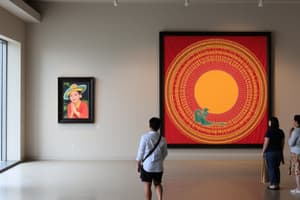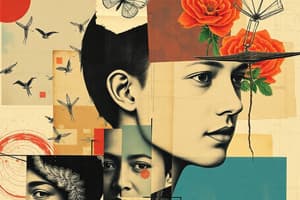Podcast
Questions and Answers
What does art education primarily focus on?
What does art education primarily focus on?
- Crafts and trades
- Performing arts such as dance and music
- Literature and poetry
- Visual arts including drawing and sculpture (correct)
Which historical influence significantly shaped art education in the Philippines?
Which historical influence significantly shaped art education in the Philippines?
- Pre-colonial artistic practices
- Spanish colonial education systems
- American philosophy of education (correct)
- European Renaissance art movements
Which of the following is not classified under art education?
Which of the following is not classified under art education?
- Sculpture
- Drawing
- Theater arts (correct)
- Painting
In what century did the influence on art education from American colonizers occur in the Philippines?
In what century did the influence on art education from American colonizers occur in the Philippines?
What is the primary distinction of art education from other forms of education?
What is the primary distinction of art education from other forms of education?
What skills are developed through engaging in arts education?
What skills are developed through engaging in arts education?
Which of the following is an impact of arts education on student behavior and performance?
Which of the following is an impact of arts education on student behavior and performance?
What common misconception do art educators often face about their profession?
What common misconception do art educators often face about their profession?
How can art integrated with other disciplines benefit students?
How can art integrated with other disciplines benefit students?
What is a consequence of viewing art education solely as an academic subject?
What is a consequence of viewing art education solely as an academic subject?
What characterized the Experimental Period of art education in the Philippines?
What characterized the Experimental Period of art education in the Philippines?
Who is recognized for initiating the New Movement in art education in the Philippines?
Who is recognized for initiating the New Movement in art education in the Philippines?
What significant change occurred in art education around 1950?
What significant change occurred in art education around 1950?
What role does the National Commission for Culture and the Arts (NCCA) play in Philippine art education?
What role does the National Commission for Culture and the Arts (NCCA) play in Philippine art education?
What was a major focus of Pablo Victoria's contributions to art education?
What was a major focus of Pablo Victoria's contributions to art education?
Flashcards
Art Education Definition
Art Education Definition
Teaching and learning about visual arts, like drawing, painting, and sculpting.
Art Education in Philippines
Art Education in Philippines
Developed from American education in the early 1900s, responding to the change from Spanish to American rule.
Experimental Period (Art Ed)
Experimental Period (Art Ed)
Early 20th century art education in the Philippines; focused on drawing, using imitation and dull methods, trying to connect drawing with other subjects.
New Movement (Art Ed)
New Movement (Art Ed)
Signup and view all the flashcards
Newer Movement (Art Ed)
Newer Movement (Art Ed)
Signup and view all the flashcards
Arts Track (Senior High)
Arts Track (Senior High)
Signup and view all the flashcards
MAPEH
MAPEH
Signup and view all the flashcards
Art Education Benefits
Art Education Benefits
Signup and view all the flashcards
Challenges to Art Education
Challenges to Art Education
Signup and view all the flashcards
Vicente Dizon
Vicente Dizon
Signup and view all the flashcards
Pablo Victoria
Pablo Victoria
Signup and view all the flashcards
NCCA
NCCA
Signup and view all the flashcards
American Influence
American Influence
Signup and view all the flashcards
Colonial Context
Colonial Context
Signup and view all the flashcards
Study Notes
Art Education Overview
- Definition: Teaching and learning focused on visual arts, including drawing, painting, and sculpture.
- Distinction: Separate from educational programs in music, dance, and theater.
Art Education in the Philippines
- Influenced by American Education: Evolved from American educational philosophy introduced during the early 20th century.
- Colonial Context: Developed as a response to the transition from Spanish to American colonial rule.
Historical Context of Art Education in the Philippines
- Art education emerged as a result of American educational philosophy introduced during the early 20th century.
- Santiago identifies three distinct periods in the evolution of art education: The Experimental Period, The New Movement, and The Newer Movement.
The Experimental Period (1915-1935)
- Focus on drawing as the primary art form, where students learned mostly through imitation.
- Instructional methods were characterized as dull and authoritarian.
- Early attempts aimed to link drawing with other subjects like English and industrial works.
The New Movement (1935-1950)
- Vicente Dizon played a pivotal role in advancing art education philosophy for both elementary and secondary education.
- Shift towards a more practical approach in the teaching of art began.
The Newer Movement (1950-Present)
- Art education officially recognized as a subject in 1950, transitioning from "Drawing" to a broader form of art education.
- Pablo Victoria integrated art into various subjects; his significant work, "Art in the Elementary School," highlights teachers' and students’ roles in art education.
- The National Commission for Culture and the Arts (NCCA) serves as the main policy-making entity for arts and culture in the Philippines.
- Art education is incorporated into the Basic Education Curriculum through the MAPEH subject, providing 4 hours of art instruction weekly from Grades 1-10.
- A specialized Arts Track for senior high students was introduced in 2016 as part of the K to 12 program, enrolling around 4,400 students by 2017.
Benefits of Art Education
- Enhances creative problem-solving abilities and makes complex concepts more comprehensible through visual representation.
- Supports development in motor skills, language, social skills, and critical thinking.
- Visual arts instruction teaches essential techniques like color, layout, perspective, and balance for effective academic presentations.
- Engaging with the arts can capture the interest of students who might otherwise disengage from traditional academic settings.
- Participation in arts correlates with higher rates of academic recognition and achievement, including awards in writing, math, and science.
- Increases attendance, graduation rates, and standardized test scores, while reducing disciplinary issues.
Challenges in Art Education
- Teaching is not a preferred career path for many Filipinos; there exists a devaluation of the profession.
- Art educators often struggle with self-esteem issues, feeling inadequate as artists and questioning the financial viability of careers in the arts.
- Art is seen merely as a subject rather than a means of self-expression, leading to a focus on academic knowledge instead of creative practice.
- Inadequate teacher training perpetuates a narrow, rigid view of art appreciation and creation.
- Student motivation is hampered by negative feedback cycles from family and peers, compounded by poor respect for art materials leading to waste and disorganization, frustrating educators.
Studying That Suits You
Use AI to generate personalized quizzes and flashcards to suit your learning preferences.




